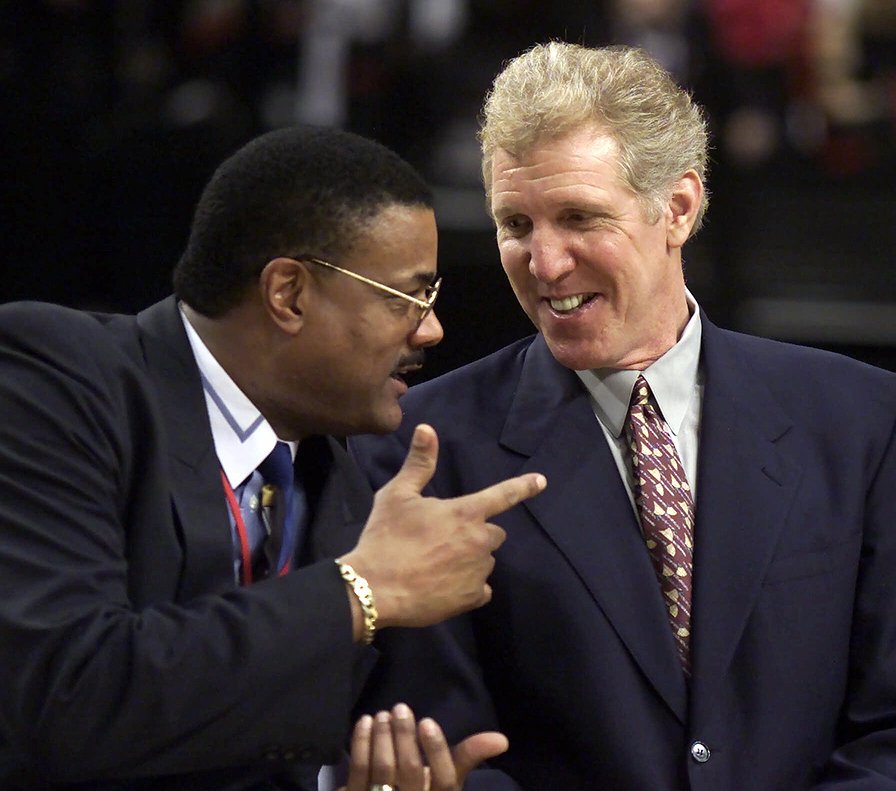THE CHEAP SEATS with STEVE CAMERON: What I learned from Bill Walton ... I could put it in a book
I’d never been more nervous before an interview.
The only time I had previously spoken to Bill Walton, it was one of those mass media scrums in a locker room.
We were never one on one.
Like so many other journalists — and Americans in general, I suppose — I had a preconceived notion of Walton.
I knew him by rumor.
This was in 1994, by the way, so Bill hadn’t yet come into so many living rooms as a fun and folksy TV commentator.
Most people had no idea that Walton even HAD a joyous side, and he hadn’t worked very hard to let it leak out.
What we did know was that Bill was one of the best big men in basketball history; that he had dominated the sport under legendary John Wooden at UCLA; that his pro career in Portland had been wrecked by foot injuries (despite an NBA championship in his third season); and that there was another side that turned people off.
Those who didn’t know him, at least.
He was an outspoken opponent of the Vietnam War, a crusader against capitalism turning into outright greed, a guy who absorbed more about our planet — and the people on it — from the Grateful Dead than he could from any puffed-up politician.
SO, WHY would a lighthearted, let’s-all-smile Californian be nervous about a first meeting with Bill Walton?
Well, fans who only got hooked on Bill and his tie-dyed TV life perhaps didn’t know about the unhappy side to his time in Portland.
He was convinced that doctors ruined his already damaged feet, just to get him on the court — and that some stories intentionally painted him as a guy who wouldn’t fight through pain to earn his paycheck.
Bill believed that reporters with darker agendas made it seem like a cinch that he not only knew about the kidnapping of newspaper heiress Patty Hearst (and her conversion to a gun-toting member of the anti-government Symbionese Liberation Army), but that perhaps he was part of the plot to hide her from the FBI.
Even his views of basketball came in for criticism.
Asked about whom he considered the other great big men to play the game, Bill naturally mentioned Bill Russell, but he waxed poetically about the almost mythical skills of Lithuanian giant Arvydas Sabonis, a 7-foot-3 ballet dancer who was forcefully kept in Europe to play for Russia during his prime — and made to battle through a torn Achilles and other ailments.
In 1992, the year that the U.S. “Dream Team” gave a world a hoops lesson at the Olympics, Walton and the Grateful Dead raised money to help Lithuania compete.
Sabonis scored 26 points and grabbed 16 rebounds, all while playing in pain, to make it through the bronze medal game.
Oh, and the Lithuanians all wore wild, tie-dyed warmups that surely made Jerry Garcia proud.
Walton, meanwhile, always seemed to convey the message that he had little respect for mainstream decision makers (and perhaps, the media that didn’t have enough courage to speak up at times it was desperately needed).
THAT was the background that preceded my first meeting with Bill Walton.
I was afraid that he’d see me as representing society’s worst traits.
Sigh.
Never, never have I guessed so wrong about anybody.
We met because I was writing a book about the 25th anniversary of the Portland Trail Blazers — a commemorative called “Rip City!” after the iconic call of broadcaster Bill Schonely, who bellowed it out whenever one of the Blazers hit a long jumper.
I had to phone Walton to arrange a meeting.
“Hi, Bill,” I said. “I think the Blazers people told you I was hoping for an interview. I’m doing a book on … ”
“Steve, how are ya,” Walton said in that breezy style. “I’ve been waiting to hear from you.
“Have you talked to Maurice Lucas? He was the soul of that championship team. Best teammate I’ve ever had. I named my son Luke after him.”
And on and on he went.
We talked on the phone for two hours — and remember, that was supposed to be just an arrangement for a meeting later.
In those couple of hours, I probably spoke for 10 minutes, and my friends will tell you that I’m always more than happy to chat away.
But Walton was off and flying with a fast-break conversation.
It was easy, it was fun, it was great hoops stuff, it was super tales about people.
I was swept into Bill Walton’s world, and never left it.
From that phone call, we wound up spending time together in Portland (he’d flown in for the meeting), and from there, we were friends.
It would be cool to say I did something special, but … nah.
Bill made friends with anyone who enjoyed his company, and how could you not?
Now, 30 years later, suddenly Bill Walton is gone.
It seems impossible.
It seems wrong.
There’s really nothing I can say now that will stand the test of time.
However, I did see a message from Barack Obama that I think speaks for me. And for millions.
“Bill Walton was one of the greatest basketball players of all time — a champion at every level and the embodiment of unselfish team play,” the president wrote.
“He was also a wonderful spirit full of curiosity, humor and kindness.
“We are poorer for his passing.”
Amen.
Email: scameron@cdapress.com
Steve Cameron’s “Cheap Seats” columns appear in The Press four times each week, normally Tuesday through Friday unless, you know, stuff happens.
Steve suggests you take his opinions in the spirit of a Jimmy Buffett song: “Breathe In, Breathe Out, Move On.”



